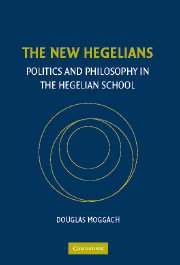Book contents
- Frontmatter
- Contents
- Acknowledgements
- Contributors
- Introduction: Hegelianism, Republicanism, and Modernity
- 1 Eduard Gans on Poverty and on the Constitutional Debate
- 2 Ludwig Feuerbach's Critique of Religion and the End of Moral Philosophy
- 3 The Symbolic Dimension and the Politics of Left Hegelianism
- 4 Exclusiveness and Political Universalism in Bruno Bauer
- 5 Republican Rigorism and Emancipation in Bruno Bauer
- 6 Edgar Bauer and the Origins of the Theory of Terrorism
- 7 Ein Menschenleben: Hegel and Stirner
- 8 ‘The State and I’: Max Stirner's Anarchism
- 9 Engels and the Invention of the Catastrophist Conception of the Industrial Revolution
- 10 The Basis of the State in the Marx of 1842
- 11 Marx and Feuerbachian Essence: Returning to the Question of ‘Human Essence’ in Historical Materialism
- 12 Freedom and the ‘Realm of Necessity’
- 13 Work, Language, and Community: A Response to Hegel's Critics
- Bibliography
- Index
6 - Edgar Bauer and the Origins of the Theory of Terrorism
Published online by Cambridge University Press: 22 August 2009
- Frontmatter
- Contents
- Acknowledgements
- Contributors
- Introduction: Hegelianism, Republicanism, and Modernity
- 1 Eduard Gans on Poverty and on the Constitutional Debate
- 2 Ludwig Feuerbach's Critique of Religion and the End of Moral Philosophy
- 3 The Symbolic Dimension and the Politics of Left Hegelianism
- 4 Exclusiveness and Political Universalism in Bruno Bauer
- 5 Republican Rigorism and Emancipation in Bruno Bauer
- 6 Edgar Bauer and the Origins of the Theory of Terrorism
- 7 Ein Menschenleben: Hegel and Stirner
- 8 ‘The State and I’: Max Stirner's Anarchism
- 9 Engels and the Invention of the Catastrophist Conception of the Industrial Revolution
- 10 The Basis of the State in the Marx of 1842
- 11 Marx and Feuerbachian Essence: Returning to the Question of ‘Human Essence’ in Historical Materialism
- 12 Freedom and the ‘Realm of Necessity’
- 13 Work, Language, and Community: A Response to Hegel's Critics
- Bibliography
- Index
Summary
Terrorism can be defined as the systematic belief in the political, religious, or ideological efficacy of producing fear by attacking or threatening to attack unsuspecting or defenseless populations, usually civilians, usually by surprise. Terrorist attacks are the desperate acts of those who feel themselves to be otherwise powerless. Terrorism is self-righteous, absolutist, and exclusivist. Its adherents are unwilling or unable to negotiate with their perceived enemies, or are prevented by political, social, or economic circumstances from doing so.
The terms “terrorism” and “terrorist” came into the language in the 1790s when British journalists, politicians, orators, and historians used them to describe the Jacobins and other particularly violent French revolutionaries. The terms have evolved since then and now typically refer to furtive acts by unknown underground perpetrators, not by heads of state or public figures such as Caligula, Ivan the Terrible, Maximilien Robespierre, or Joseph Stalin.
Terrorism as we now understand it was not possible until the invention of gunpowder and subsequent explosives and incendiaries. Before that, political assassinations, gigantic arsons, large-scale massacres, and other horrendously terrifying acts certainly occurred, but small cadres of insignificant citizens generally lacked the means to actualise sudden massive destruction by stealth. Roger Bacon's invention of gunpowder in the thirteenth century and the introduction of firearms in Europe in the fourteenth enabled weaklings to outmatch and regularly defeat, for the first time in history, mighty warriors armed with sword or spear. Davids proliferated and all Goliaths became vulnerable.
- Type
- Chapter
- Information
- The New HegeliansPolitics and Philosophy in the Hegelian School, pp. 136 - 165Publisher: Cambridge University PressPrint publication year: 2006
- 2
- Cited by



